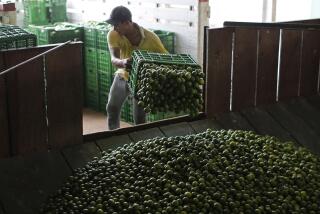Venezuela seizes sugar plantations
- Share via
BOGOTA, COLOMBIA — Venezuelan armed forces occupied 32 sugar plantations Thursday, the latest in a wave of takeovers that some say is a bid by President Hugo Chavez to regain political momentum and reverse his recent slide in the polls.
The farms in Lara state were taken over by army units at the request of the Chavez government’s National Land Institute, or INTI. The institute in recent years has handled the takeover of thousands of acres of farmland and turned them over to worker cooperatives.
The government last week said it would seize privately owned cement manufacturers, and Wednesday it said it would “renationalize” Sidor, one of Latin America’s largest steel factories. A 1998 privatization placed Sidor in the control of an Argentine-Italian joint venture.
INTI President Juan Carlos Loyo told reporters that the farm seizures were ordered after inspections showed 80% of them were idle.
However, the local association of sugar growers said at a news conference that the farms were productive and that they would fight the “militarization” of their crops.
The seizures are part of Chavez’s “socialism for the 21st century” agenda, in which he is using Venezuela’s oil riches to transform the economy. But they also show the challenges facing him and his Bolivarian Revolution, and it is unclear whether replacing private enterprise with state-financed worker cooperatives and other measures will succeed at reviving his popularity.
Critics said the takeovers appear politically motivated as Chavez strives to regain favor with the public and shift blame to the private sector for food and housing shortages and inflation.
With state and local elections scheduled for November, Chavez is attempting to demonstrate strength, observers said.
The president has seen his approval rating plummet to 37% in March from 50% last June and as high as 66% in December 2005, according to Alfredo Keller & Associates in Caracas, Venezuela.
Chavez suffered his first setback at the polls in December when he lost a voter referendum that would have expanded his power and enabled him to run indefinitely for reelection.
The inflation rate last year exceeded 20%, the highest in South America. Basic foodstuffs such as milk, chicken, beans and cooking oil often are difficult to buy.
In January and February, Chavez scored public relations coups by brokering the release of six hostages held by the Colombian rebel group the Revolutionary Armed Forces of Colombia, or FARC.
But he squandered much of the goodwill by leading a campaign to legitimize the rebels, an idea rejected by many Venezuelans and Chavez allies abroad.
Now he faces more criticism because of files found on the laptop computers of a dead FARC commander. Colombian authorities have said the information includes documents indicating that the FARC received $300 million from Chavez and that the rebels were seeking to acquire uranium, possibly for a weapon.
“I think the takeovers are defensive moves, ahead of bad news, to shore up his base of supporters among the poor,” said David Scott Palmer, who is head of Boston University’s Latin American studies program.
Margarita Lopez Maya, a historian at Central University of Venezuela in Caracas, the capital, said nationalizations were a “characteristic” of the Chavez government, and of previous Venezuelan leaders flush with oil dollars.
“But it’s an error to think that a government that is inefficient can make private companies run more efficiently. In fact, the opposite has turned out to be the case,” Maya said, noting that hundreds of companies owned by the government went bankrupt in the 1980s.
Chavez last year forced foreign oil companies, including Exxon Mobil Corp. and ConocoPhillips, to give up control of heavy-oil fields in eastern Venezuela. Chavez also nationalized the country’s largest telecommunications company, as well as Caracas’ principal electric power generator.
The expropriations are unpopular with many Venezuelans, said Gustavo Garcia, an economist at a Caracas-based graduate business school known by its Spanish initials IESA.
He thinks the real goal of the takeovers is “to blame the private sector for problems he cannot resolve.”
“By doing this, Chavez is blaming the sugar companies for the fact there is no sugar in the markets and the cement companies for the shortage of construction,” Garcia said.
The case of Sidor is delicate politically because the majority shareholder in the company is based in Argentina, whose president, Cristina Fernandez de Kirchner, is a close Chavez ally.
But it was unclear Thursday what the Argentine government could do on behalf of the Argentina-based firm.
Chavez has previously reimbursed the foreign companies as well as Venezuelan farmers for the value of assets taken over, although owners have complained of lowball valuations.
Mexico-based Cemex, which operates the largest cement plant in Venezuela with nearly half the local market, said it was in talks with Chavez officials over compensation.
Mexican lawmakers passed a motion Wednesday urging President Felipe Calderon to stand up for Cemex’s interests.
--
Special correspondent Mery Mogollon in Caracas, Times staff writers Patrick J. McDonnell in Buenos Aires and Marla Dickerson in Mexico City and Cecilia Sanchez of The Times’ Mexico City Bureau contributed to this report.
More to Read
Sign up for Essential California
The most important California stories and recommendations in your inbox every morning.
You may occasionally receive promotional content from the Los Angeles Times.










